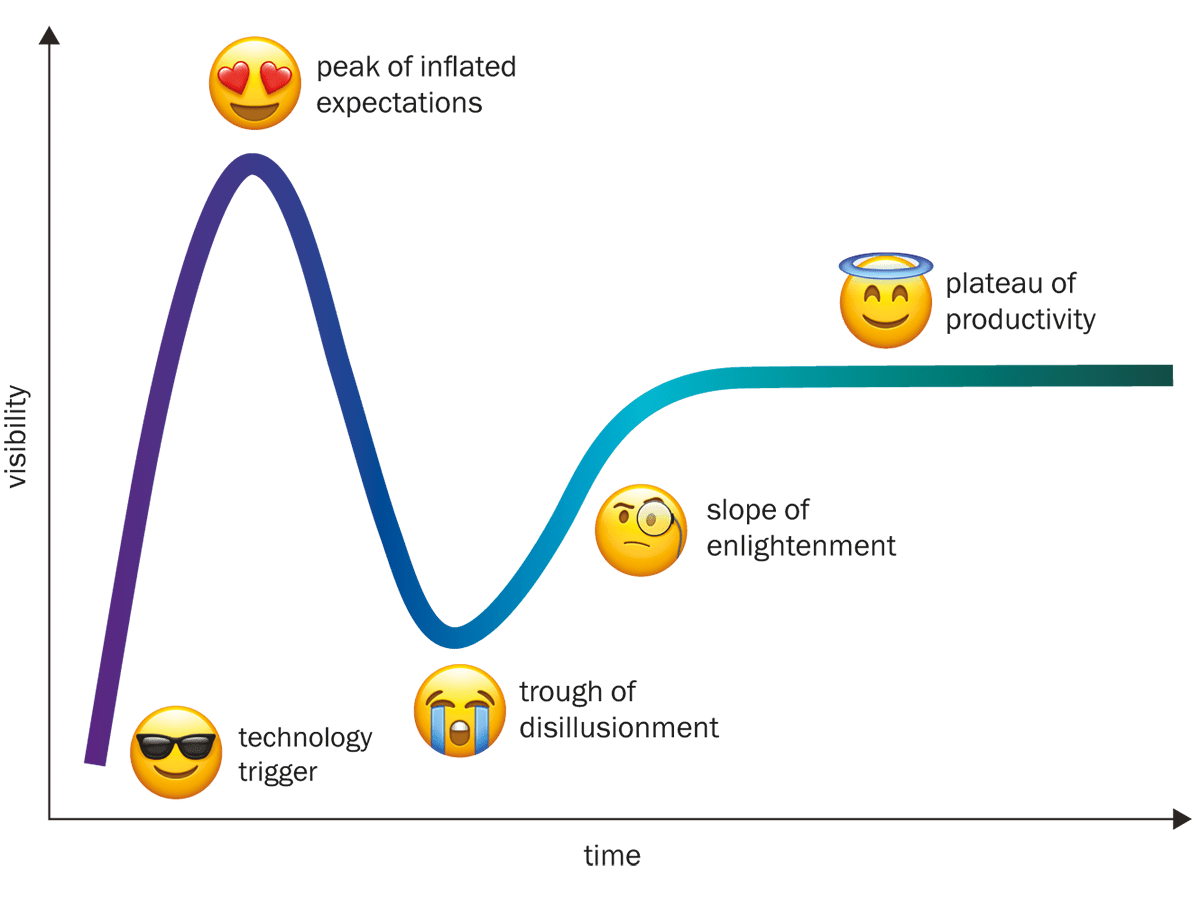When will quantum computers finally break into the market?
03 Apr 2023 James McKenzie
With all the hype and excitement surrounding quantum computers, James McKenzie wonders when they will become mainstream products and what they will be useful for
Ups and downs The Gartner hype cycle depicts how any new technology goes through five main phases: quite where quantum computers currently sit is anyone’s guess.
With so much excitement surrounding quantum computing – including a new £2.5bn, decade-long UK programme – how can we attempt to predict what the future will bring? One place to start is a graph devised in 1995 by Jackie Fenn, an analyst from US tech consultants Gartner Inc. Now known as the “Gartner hype cycle”, it shows how the expectation surrounding a particular technology develops over time. Having lived through a fair few technology cycles myself, I can safely say the graph is pretty accurate.
We invariably start with a “technology trigger”, when everyone notices that something big is happening. Interest rises sharply and money starts flowing in. Excitement mounts until we reach a “peak of inflated expectations”. Then interest starts to fall back until we hit a “trough of disillusionment” as people realize things are harder and trickier than imagined. Later, activity picks up again via a “slope of enlightenment” until we reach a “plateau of productivity”, where firms – finally – realize what works and know what customers want.
What the Gartner hype cycle tells us is that there will be plenty of winners in quantum computing but lots of losers too. Some firms will run out of money because they’ve followed approaches that can’t be scaled up as the market expands or because of poor execution, bad timing or management mistakes. Right now, though, there is plenty of money going into quantum computing, with estimates from Quantum Insider putting the figure at £3.2bn in 2022.
Some firms are even getting product orders. They include Universal Quantum, which has bagged a €67m contract with the German Aerospace Center. There’s also ORCA Computing, which won a business-start up award from the Institute of Physics in 2020 and now has an order for its ORCA PT-1 device from the UK’s Ministry of Defence and others from the Israel Quantum Computing Centre. ORCA’s machine is the first of its kind that can work at room temperature.
Many potential customers will not understand the benefits of quantum computers until they see working systems solve their problems
But as ORCA boss Richard Murray rightly pointed out in a recent Forbes article, the challenge is working out what quantum computers can best be used for. As with any new tech, there’s no easy answer, with many potential customers not understanding the benefits until they see working systems solve their problems. It’s safe to say, though, that quantum computers will be particularly good at tackling certain problems that are difficult or even impossible for classical computers to solve. Many worlds Quantum computers could be used to crack encryption algorithms, solve complex optimization problems, simulate quantum systems and improve machine-learning algorithms. (Courtesy: iStock/Olemedia)
Many worlds Quantum computers could be used to crack encryption algorithms, solve complex optimization problems, simulate quantum systems and improve machine-learning algorithms. (Courtesy: iStock/Olemedia)
 Many worlds Quantum computers could be used to crack encryption algorithms, solve complex optimization problems, simulate quantum systems and improve machine-learning algorithms. (Courtesy: iStock/Olemedia)
Many worlds Quantum computers could be used to crack encryption algorithms, solve complex optimization problems, simulate quantum systems and improve machine-learning algorithms. (Courtesy: iStock/Olemedia)One of the most well-known applications is Shor’s algorithm, which can factor large numbers exponentially faster than classical algorithms. Indeed, the US National Institute of Standards and Technology (NIST) has already said that quantum computers will, by 2029, be able to break existing public-key infrastructure like 128-bit AES encryption, which is currently used to protect sensitive information sent over the internet.
This application is driving the market and the need for large machines with 10,000 quantum bits (qubits) or more. They will mostly be used for intelligence operations to decrypt data that have been stored with relatively low amounts of encryption (although, ironically, such data will probably be old and not that valuable). So if quantum computers become a reality, their ability to crack encryption algorithms will compromise the security of the Internet and damage global security.
It’s an issue recognized by many governments and organizations including NIST itself, which has launched a programme to develop new “post-quantum” cryptography standards that will be resistant to attacks by quantum computers. These new standards will be designed to be secure even if an attacker has a quantum computer.
Make it work
Powerful, cost-effective quantum computers will also be great at using special algorithms to solve complex “optimization” problems, such as scheduling, routing and logistics. These involve seeking the optimal solution from lots of possibilities – the most famous being the “travelling-salesperson problem”, which requires finding the shortest possible route between various cities so that each is visited at least once before returning home. Firms like Amazon, Fedex and UPS, which focus on delivery and logistics, will surely want to get into quantum tech.
Another exciting application would involve simulating quantum systems, which is tricky to do with a classical device. Quantum computers would therefore be perfect for quantum chemistry, which involves simulating the behaviour of molecules and chemical reactions. I can imagine a huge potential market for pharmaceutical companies developing new drugs, manufacturers building new types of battery or firms creating new materials.
Then there’s machine learning and artificial intelligence (AI). Quantum computers should be able to improve machine-learning algorithms – potentially quite dramatically – by providing faster and more efficient optimization routines or by exploring new models and architectures. This could be a massive new market, but it will depend on the quantum-tech sector building practical, large-scale quantum computers and developing the algorithms and applications that can take advantage of their unique capabilities.READ MORE

In fact, there are many approaches in play at the quantum hardware level. As I have mentioned, companies like Google, IBM, Orca, Rigetti and Universal Quantum are already developing quantum processors with increasing numbers of qubits. There has been a lot of research into developing new types of qubits, such as topological qubits, which are more resistant to noise and errors. But it’s not clear if they will win out or whether superconducting qubits, ion-trap, silicon or optical qubits, will prevail.
We’ll also have to develop operating systems for all these hardware options, while algorithms will have to be built and tested too. In fact, it will take years – if not decades – before potential customers can fully understand the cost-benefit of quantum computers. Why spend money on a new quantum computer if a classical computer can do the job just as well?
Uncertainty surrounding quantum computers will vanish only when someone starts selling a scalable, affordable hardware platform, with 10,000 qubits or more
Sure, a few early applications of quantum computers will reach the market, but the uncertainty surrounding these machines will vanish only when someone starts selling a scalable, affordable hardware platform, with 10,000 qubits or more. That’s when quantum computing will take off and we’ll be sure what they’re good for. Physicists might be in awe of all things quantum, but quite when it’ll reach that “plateau of productivity” is anyone’s guess.

James McKenzie is the writer of the Transactions column for Physics World about physics in industry. He is writing here in a personal capacity
FROM PHYSICSWORLD.COM 11/4/2023

Δεν υπάρχουν σχόλια:
Δημοσίευση σχολίου